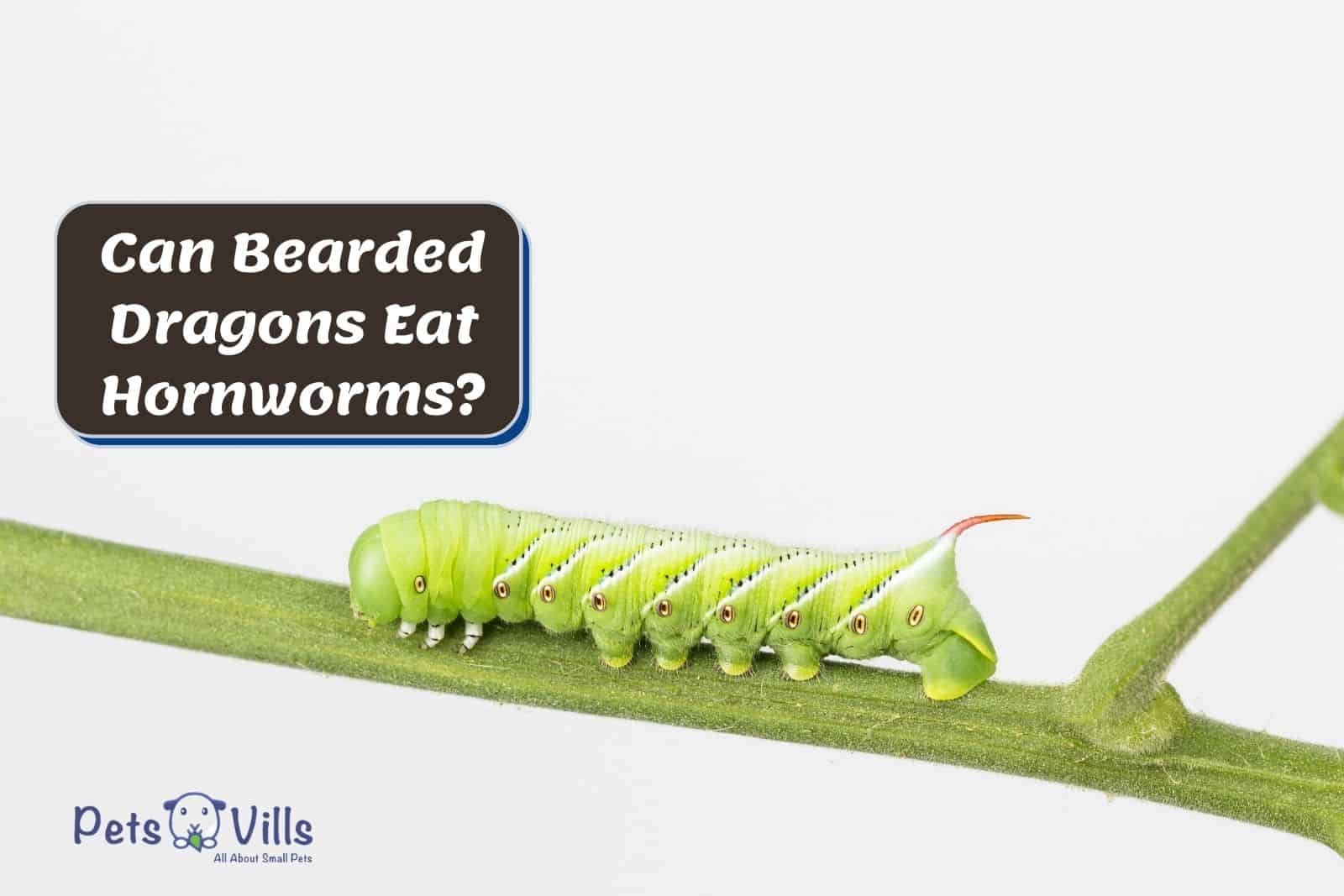Can bearded dragons eat hornworms?
A common question beardie parents wonder about, myself included!
I’ve done extensive research, and I am sharing my findings with you!
Read on to learn more about feeding your bearded dragon hornworms.
This post contains affiliate links. We earn a commission if you make a purchase after clicking on our links.
Don’t have time? Check this comparison table of our top faves!
READ MORE: Best Veg for Bearded Dragons
Table of Contents
Are Hornworms Good For Bearded Dragons?
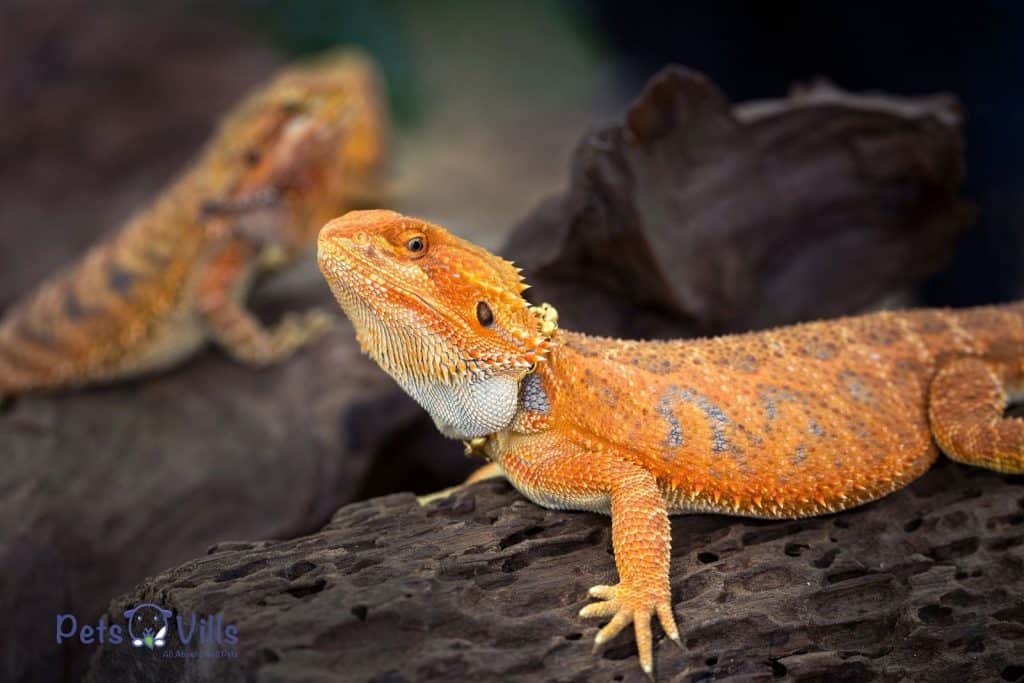
Yes. Beardies are omnivorous, meaning they can feed on both insects, and plant materials. This means you can add this tasty (according to beardies) insect to your pet’s diet.
The worms are great for your beardies, especially when served as a live meal.
They provide nutrients such as calcium, protein, and water to the diet. (1)
The type of worm also matters. Hornworms bought from the store, or those raised at home by bearded dragon owners are the recommended type because they are safe.
ALSO READ: Best Insects for Bearded Dragons
Can Baby Bearded Dragons Eat Hornworms?
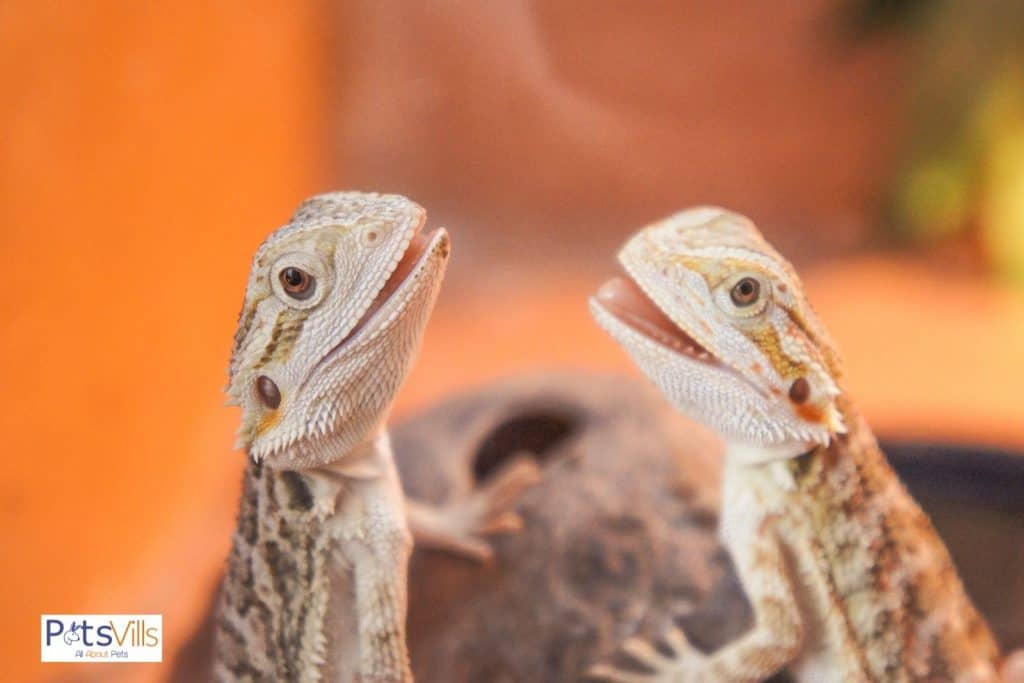
Yes, baby beardies can eat hornworms but you must do it with caution. Only feed them in moderate amounts and make sure that the worms are small enough for your pet to eat and digest.
Can Bearded Dragons Eat Hornworm Moths?
Hornworm moths are a bit bigger and tougher, making them suitable for adult dragons only. Adult dragons can swallow them in their largest stage with ease.
To avoid the risk of choking, the rule of thumb is “no bigger than the space between eyes”. It is a good idea to strictly adhere to this rule to ensure your pet’s health and safety.
My beardie guy prefers to eat a huge adult moth and he sure makes a mess! He loves the beautiful moth!
Can Bearded Dragons Eat Dead Hornworms?
Yes. Bearded dragons can eat dead hornworms.
However, you might notice that beardies have problems recognizing dead stuff as food.
Fortunately, this does not mean that the beardie will not eat the dead worms.
However, the lizards are more likely to recognize and appreciate a warm and live worm as food. So, you are more likely to succeed in feeding your pet if you provide the meal live.
Dead hornworms are not as nutritious as your bearded lizard.
They may also pose a health threat due to the possibility of getting salmonella poisoning that can be found in dead worms.
CHECK: How Many Crickets to Feed a Bearded Dragon?
Can Hornworms Hurt Bearded Dragons?
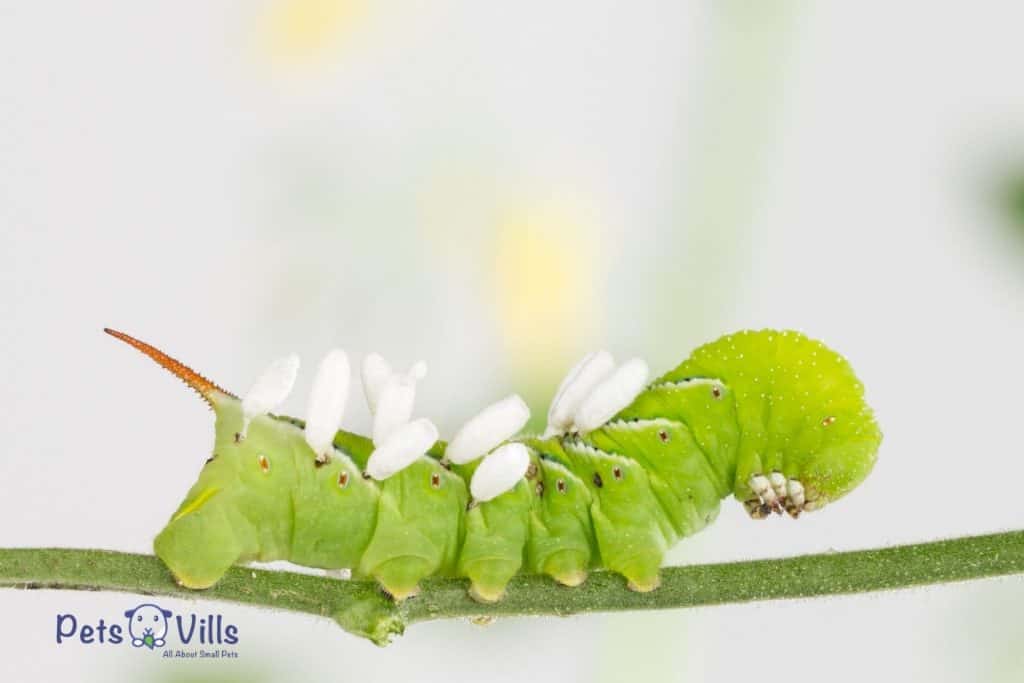
It is unusual for hornworms to bite your beardie friend, but it is possible if you provide the wrong size worm.
For instance, juvenile or baby dragons should not be fed mature hornworms. Mature hornworms are too big and hard for baby dragons to swallow.
Also, do not feed your reptile with too many worms, to avoid the risk of indigestion.
Benefits of Hornworms For Your Beardie
These worms have vital nutritional benefits for your beardie if fed the right way. They are fantastic sources of protein, calcium, and amino acids.
The amounts of protein in the worms foster the growth and development of baby dragons.
They are also an excellent source of moisture. Which is helpful for lizards that don’t like to drink from a bowl.
These insects also contain zinc, manganese, and copper which is good for your lizard friend.
ALSO CHECK: Bearded Dragon Favorite Food
Feeding Hornworms To Your Beardie: Things To Consider
Serving your pet lizard hornworms is pretty easy. You only need to consider a few things.
- Always remember that your beardie pet prefers to have their worms or any other feeder insect alive. Keep it that way, as much as possible.
- Do not only rely on hornworms to supply sufficient nutrients for your pet. Consider adding other nutritious foods such as meal worms, super worms, and silkworms.
- Keep in mind that beardies are omnivorous, so make sure to include veggies and greens.
- Stick to the rule of thumb about feeding beardies nothing larger than the space between their eyes. (2) So, it is advisable to slice the greens and veggies into swallowable pieces, especially when dealing with juvenile or baby dragons.
- Don’t make these worms the staple insect. Combine them with other foods to create a balanced meal. You may add another tasty occasional treat to your pet’s diet in addition to the staples.
- Consider dangling the worm in front of your beardie and see how stimulated they become. I like dangling that worm because I enjoy seeing that quick tongue snatch.
Check out Sweetie the dragon eating, including hornworms, in this video.
When Can Bearded Dragons Eat Hornworms?
Bearded dragons can safely eat hornworms at the juvenile stage which is between five to eighteen months. Juvenile lizards can be fed a diet of approximately half insect and half plant matter. (3)
The juvenile stage requires a healthy daily diet because growth is at its peak. This is a perfect time to feed your pet foods rich in calcium to boost their skeletal muscle growth and development.
Worms are at the top of the list when it comes to these essential nutrients.
How Many Hornworms Can a Bearded Dragon Have in a Day?
The number of hornworms your beardie can have in a day depends on its age and appetite.
Juvenile or baby bearded dragons require more worms for their growth and maintenance, unlike adult lizards.
Baby bearded dragons can eat just a small amount each day, while juveniles can have several, so long as you mix in other insects. Once a beardie reaches adulthood it should be fed more vegetables. A proper diet for adult beardies can include 9 – 15 hornworms per week.
Although hornworms are a nutritious food, overfeeding can cause over-hydration because the worms have a high water content. There can be too much of a good thing as the saying goes.
How Often Can Bearded Dragons Eat Hornworms?
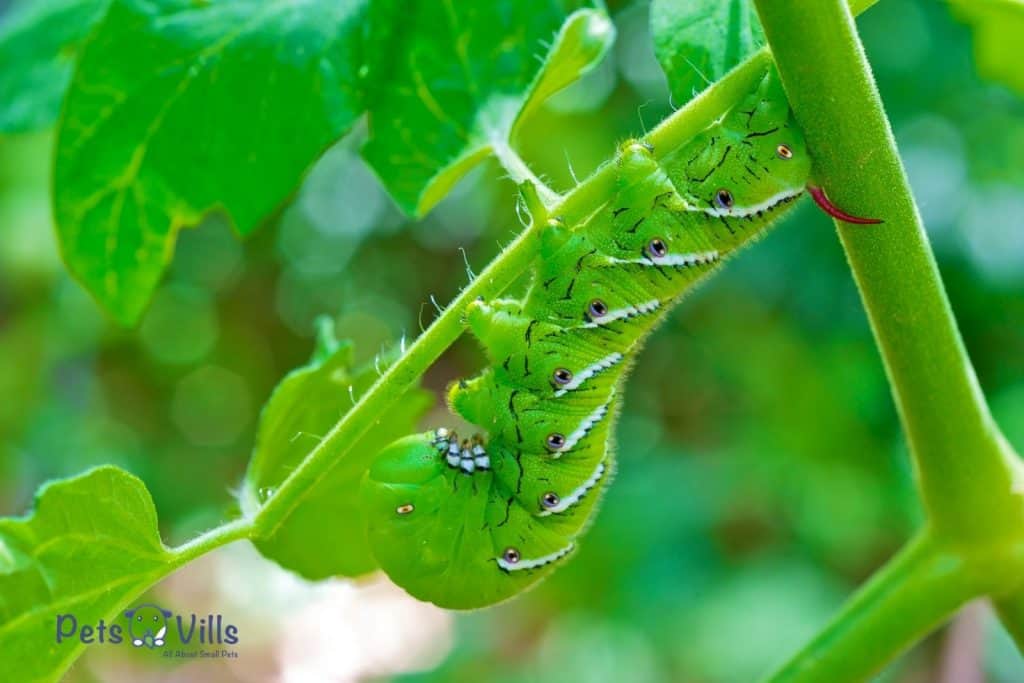
Hornworms should not be fed daily to adult beardies.
It is recommended that you only serve 3 – 5 of them to your beardie around three times per week which works out to 9 – 15 hornworms per week.
Though it is possible to give them daily in moderation, so long as the rest of the diet is balanced.
The growth and development stage of the juvenile dragon calls for more calcium content and a regular protein source. Hornworms are a good source of calcium and protein, so they can be served regularly.
Always include a good portion of veggies and greens in your adult’s diet.
How to Feed Hornworms to Bearded Dragons?
Feeding bearded dragons doesn’t just involve throwing food in the tank. Here are a few considerations to keep your pet happy and healthy.
- Always remember that feeding beardies, especially babies and juveniles, pieces of food larger than the size of their eyes pose a choking risk.
- Also, extremely large food sizes can press on the pet’s spinal cord which may lead to paralysis and in some cases death.
- Feed your bearded dragon in a 10 – 15 minute window of time. Feed the bearded dragon as much as it will eat during this time.
- Do not feed the hornworms only. Dangle 1 or 2 crickets in between each hornworm for an extra protein meal!
- Always remove excess live food when your beardie stops eating. This is because live food can bite your lizard.
- Finally, never feed your beardie pet wild-caught hornworms, such as tobacco hornworms
Hornworms Handling Tips
One thing to remember is that you must never feed your bearded dragon a wild hornworm. Wild hornworms, such as tobacco hornworms, may have ingested poisonous matter which could harm your lizard.
Always source your worms from a reputable supplier and store them correctly.
Where to Buy Hornworms
There are numerous worm suppliers on the internet, including Amazon. Look for pet stores that cater to exotics as well to find them.
How to Keep and Store Hornworms
The life span of an adult hornworm is around two to four weeks. This may vary depending on the temperature – warmer temperatures speed up the growth process and vice versa.
Remember that these worms are considered agricultural pests and should not be disposed of carelessly. Put unwanted worms in a sealed container and freeze for 48 hours.
After freezing, dispose of them in regular solid waste. Unwanted eggs can be frozen or immersed in alcohol.
Hornworms can last for a couple of days (1 week) if stored in a refrigerator. Put them in a container with a paper towel at the bottom for effective moisture absorption.
Remember the worms should be kept alive and containers placed in a safe and dry area. If you want them to grow faster, place them in an area with a temperature around 82 degrees Fahrenheit
If you want them to grow slowly, keep them somewhere around 55 degrees Fahrenheit. To stop the growth completely, place them in a refrigerator for no more than two days.
This video shares some tips on how to care for and keep hornworms.
Frequently Asked Questions (FAQs)
At what age can bearded dragons eat hornworms?
Bearded dragons can have these non-harmful insects right from when they are baby dragons. No worries!
Can bearded dragons eat tomato hornworms?
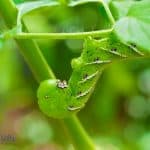
Yes. Tomato hornworms, often called caterpillars, are good additions to your beardie’s diet, but shouldn’t make up the bulk of your insect meals.
Can a Hornworm be too big for a bearded dragon?
Yes. Only feed your beardie a hornworm that is not bigger than the distance between their eyes. Adhere to this rule, particularly when dealing with juvenile or baby dragons.
Conclusion
Hornworms are great for bearded dragons, although they should be served as part of a well-balanced diet. I love watching how my beardie pet enjoys this delicious meal. Let your beardie pet enjoy too!
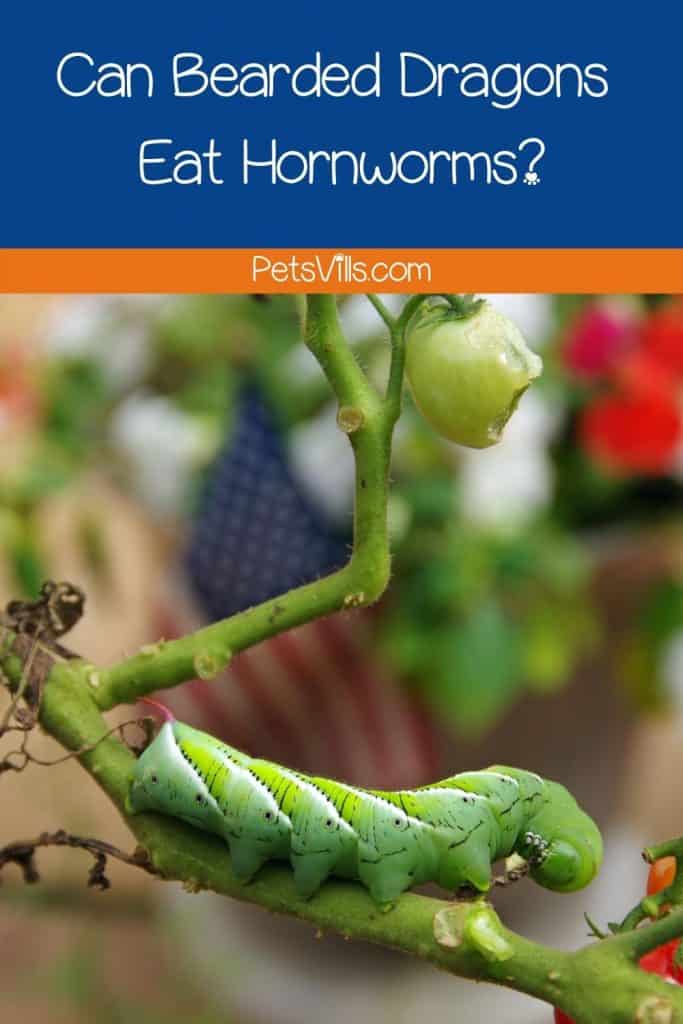
Resources
- 1. Boyer, DVM TH. Diseases of Bearded Dragons [Internet]. [cited 2022 Jun 5]. Available from: https://newcms.eventkaddy.net/event_data/60/session_files/AV017_Conference_Note_jjacobs_cvma.net_AV017BOYERDiseasesofBeardedDragons_20150512213937.PDF
- 2. Magnuson M. Introduction to Bearded Dragon Care Canobie Lake Veterinary Hospital [Internet]. Available from: http://greenlandvet.com/wp-content/uploads/2017/02/Handout-Bearded-Dragon-Patti-Dressel.pdf
- 3. Doneley B, Health A, Toowoomba W. EXOTICS -REPTILES AND AMPHIBIANS 1607 CARING FOR THE BEARDED DRAGON [Internet]. Available from: https://www.cabi.org/ISC/FullTextPDF/2006/20063121821.pdf
Alina Hartley is a small-town girl with a ginormous love of bearded dragons. It all started with Winchester, a baby bearded who was abandoned at the shelter by his former owners because of a birth defect that caused one front leg to be shorter than the other. Alina originally went to the shelter looking for a guinea pig, but one look at Winchester and it was love at first sight. From that day on, Alina has dedicated her life to learning everything she can about bearded dragons. She loves helping new beardie parents start their incredible journey with these magnificent reptiles.
Follow her on:
LINKEDIN
TWITTER.
Read her latest articles HERE
Learn more about her HERE.

